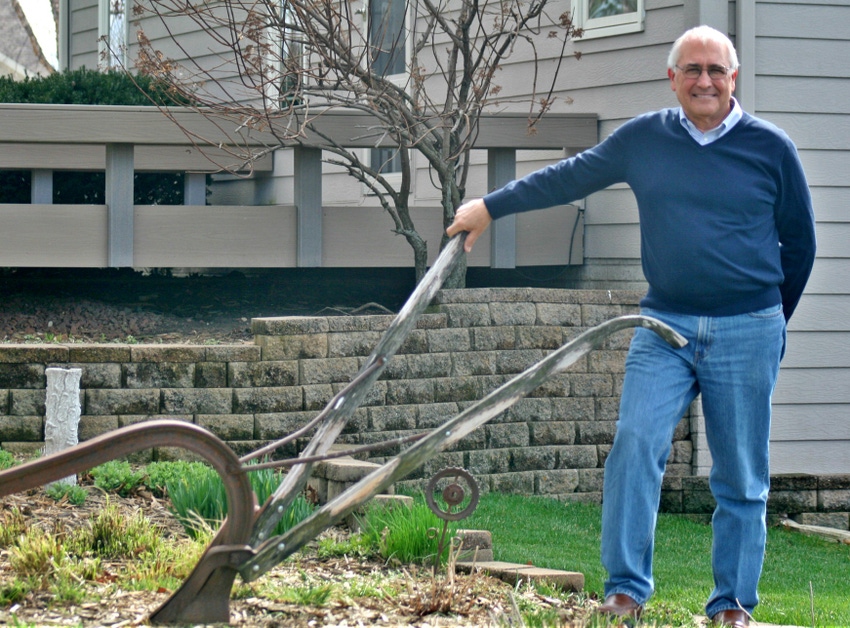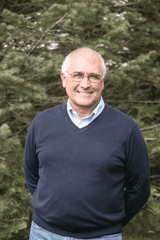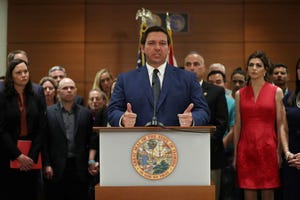2016 Pork Master: Rich Degner
The Masters of the Pork Industry are a very special, handpicked group of pork industry leaders. These are their stories.The Masters share their personal stories and philosophies about life, their careers in the pork industry and their visions for the future.They are professionals, entrepreneurs and family-based pork industry enthusiasts whose dedication and wisdom are sure to inspire young and old as they tackle the challenges and opportunities that lie ahead in an ever-changing global pork industry.


Leading by serving others first has always been the guiding principle for Rich Degner. As the chief executive officer of the Iowa Pork Producers Association, Degner never strived to be the face of the organization, but rather to nurture the members to be outstanding leaders. He measured his success if pork producers up and down the state of Iowa actually never knew who he was.
After obtaining his agriculture education degree from Iowa State University, Degner taught agriculture students for four years before accepting a position with the IPPA. As the job positions with the association changed over the years, Degner’s leadership style never changed. It really did not matter if it was in his early career years in the classroom as a vocational agriculture teacher or as an association staff member, his students, pork producers and employees knew that Degner was always there for them, and he put them first.
From the beginning, Degner realized members are the most valuable asset of an organization. As their guidepost, he worked to promote and serve the well being of Iowa pork producers for 35 years without seeking any credit.
“My management style was such that I wanted to make sure I had leaders that are well-versed, knowledgeable, and they are the ones to deliver the appropriate messages. If I was interviewed on issues dealing with the Iowa pork industry at that point of time, I viewed myself as having failed.”
Assisting Iowa pig farmers was not a job done alone. Perhaps, building from his teaching days, Degner was willing to hire young, inexperienced but pork-enthusiastic employees. He brought them on board to team IPPA and worked with them. For the most part, it worked well. He says, “I am really pleased with the various people I worked with over the years. There are just a whole lot of talented people.”
When Degner looks back over the last half of his career, he openly admits that he did not know everything about pork production. However, he hired a team that grew up in modern production and was very involved in the industry. From his perspective, a team with the practical knowledge of pig farming was essential.
As a leader, Degner acknowledges that there are multiple ways to get to an endpoint. He trusts team members to bring their approach and ideas to the table to finish the task. He is not a micromanager, but always expects employees to ask questions when necessary and, more importantly, ask for help when they are struggling.
Still, modestly, Degner does not think as himself as a “Master,” but his colleagues and the state’s pork producers disagree. For over three decades, the issues shaping the No. 1 state for pork production have evolved, but Degner has proven to be a stable, strong leader, and those working with him came to really appreciate his leadership style.
“The strong thing about Rich is he encouraged people to be leaders and always wanted producers to step up and be the face of the organization,” says Al Wulfekuhle, IPPA president and Iowa pork producer. “He built leaders because we need leaders in the industry, and he did a good job of that. He encouraged me to step up, and he was always in the background to help you out.”
Degner embarked on his association career in 1980 as the program and communication director. At the same time, the organization grew his responsibilities, and opportunities to lead evolved. In 1998, he became the chief executive officer of the leading pork-producing state, serving in that capacity for 17 years.
On his first day on the job at IPPA, Iowa was producing one-fourth of the nation’s pork and is now a place where 20 million (one-third) of the nation’s pigs are raised. The transformation of Iowa’s pork industry was not by accident. Iowa as a state views agriculture as a major economic contributor, and it puts big money on the line every day to back the agriculture industry that has spawned a diverse state economy. Hog farming alone today accounts for $7.5 billion in total economic activity. Degner says, “Iowa recognizes it is an agricultural state, and it does not apologize for it.”
The longevity of a robust pork industry is a result of great leaders shepherded by mentors like Degner, building business partnerships with government, communities, private business, agriculture associations and educational institutions.
Rural communities understand the economic benefit of the pork business. For example, Degner says, take a look at the extreme northwest corner of Iowa in Sioux and Lyon counties. There is a lot of livestock production and many schools. It takes a lot of people to keep the entire livestock business going. Counties with heavy livestock density are not declining in populations and have fewer school consolidations in comparison to the rest of rural Iowa. He says, “It is evident that livestock is good for Iowa’s economy.”
Moreover, the fact that companies chose Iowa to build two brand-new processing plants with backing from state government and community is testimony to the health and support of Iowa’s pork industry.
Growing Iowa pork sales meant focusing on consumers beyond Iowa’s borders. Since 1989, Degner has traveled abroad with agriculture, business and government leaders on Iowa meat missions. IPPA aggressively invested in foreign market development along with the Iowa Economic Development Authority. The IDEA coordinated the trips with the U.S. Meat Export Federation to various countries, identified as great markets for U.S. meat. At times, Iowa meat company representatives and representatives of other Iowa agricultural groups such as the Iowa Beef Industry Council, Iowa Farm Bureau Federation and Iowa Corn Growers Association will join the IPPA on the missions. The global trips, in general, help put a face to an industry, and global customers become more comfortable with U.S. pork producers, which ultimately sells more pork. Overall, Degner says, “It truly has paid dividends. It would be interesting to know how many Iowa pork producers have now traveled abroad. They were able to get a view of the global economy and a view of what the world is like beyond the state view.”
Degner points out that another critically important factor to the success of Iowa pork producers was the development of a strong relationship with Iowa State University. He says, “ISU personnel have conducted important research; they have provided high-quality and timely diagnostic services; they have provided invaluable producer education programs, including Pork Quality Assurance Plus and Transport Quality Assurance training for thousands of pork producers; and they provide high-quality education for young people who become pork producers or service providers to pork producers. The Iowa Pork Producers Association has provided funding for research proposals, startup research packages for new faculty members, scholarships for undergraduates, fellowships for graduate students and new building projects.”
Taken as a whole, he says, “The association is very strong and financially very stable. It had good leadership. The idea that the state of Iowa is producing 30% of the nation’s pork indicates we have been taking the right approach.”
Breaking down the barriers
However, the road to become No. 1 in pork production was not without tribulations. Degner entered the pork world in 1980, a decade known for economic stress. Many Iowa farmers were diversified and carrying heavy land debt. Meanwhile, the North Carolina pork industry was firing up and set to give Iowa a run for its money with new facilities and embracing new production methods. Iowa producers were stalled by financial institutions not willing to lend money to retool the pork industry. Degner explains, “Iowa pork producers were really behind the curve, especially when you took a look at efficiency. Reality is, some of the ag lenders moved Iowa producers out of the pork industry because they saw what was going on in North Carolina, and they were under the opinion that their farmer-borrowers were not going to be competitive.”
As the Iowa pork industry revitalized at the turn of the new decade, the activists set their sights on pig farming, and pork producers found themselves in uncharted territory, fighting to farm. Degner says, “My take on it is activism has become an industry, and there is money in those issues. So there are an increasing number of people who are engaged in activism and not necessarily looking for solutions, but wanting to drive it to their position.”
New building construction was the mission for the Iowa pork producers in the 1990s, but the industry faced large opposition from the community, which also sparked a regulation boom. Feeling the heat, the association took a serious and unpopular approach toward the threat of increasing regulations. Instead of building a defensive stone wall, the IPPA was determined to engage in the regulation talks, but it was not without criticism from fellow pork-producing states. Degner says, “We had some people from some other states say, ‘Those of you in Iowa are foolish. You are coming to agreement to be regulated, and that is going to be the death of the pork industry in Iowa.’ That is what some of those outside of Iowa were predicting.”
Nevertheless, he further explains that the organization realized that it did not have the ability to stand and fight. He says, “So, we had to embrace the concept of being regulated, but do it in a manner which is responsible, and producers could operate with appropriate economics. We ended up in a situation in Iowa where our buildings were dispersed, required to have manure management plans, and essentially we cannot exceed crops’ uptake of nutrients.”
The proactive approach to regulations did not prohibit growth of Iowa’s pork industry as predicted. In spite of everything, Iowa pork producers under new regulations actually increased the size of the herd. In fact, the written regulations to not exceed crops’ nutrient uptake leaves the state plenty of room for more livestock because the state is also a top producer of corn and soybeans. Degner says, “We do not have enough manure. If Iowa is going to be truly sustainable, then we need more livestock even today.”
Still, at the end of the day the net result was a powerful economic situation. Iowan hog farmers and even new players from other states embraced the new technology already utilized in North Carolina and put up new buildings on row-crop farms wanting to bring back the next generation to the operation. It was also a way to bring a more sustainable fertilizer approach to the farm.
Consumer connection
Over his career, Degner has endured the up-and-down cycles of the hog farming economy, along with the
shift in consumer preferences and demands. He recalls one fascinating experience occurring at the bottom of the roughest times in the hog market with cold storage overflowing with pork bellies. In many trips to Washington, D.C., with national pork leaders like Don Gingerich during President George H.W. Bush’s administration and the time when Poland was coming out from behind the Iron Curtain and looking for assistance, Gingerich proposed a plan to ship the surplus of pork bellies to Poland as food aid. Chuckling, Degner says, “Take a look at when bellies were a drag on the market until today. There is this love affair with bacon.”
Consumers can be fickle and can have a large impact on pork demand. Keeping up with the ever-changing consumer is not easy. Degner gives all the credit to the national organizations for being out front and getting a feel for consumers’ attitudes. Their forethought keeps hog farmers in line with consumer demand. As a rule, Iowa hog producers are willing to openly accept ideas from staff, scrutinize the concept and adopt the right strategic plan to advance the pork business. Degner says, “I really tip my hat to pork producer leaders because when there is an issue, they are willing to take it on.”
One thing he found refreshing is some pork producers are willing to embrace niche markets. There has been a group of individual pig farmers that have embraced both arenas — traditional production and specializing in providing an upscale product such as Berkshire pork. Again, it comes down to taking the business approach to do whatever it takes to provide the kind of pork that consumers want.
Consumer relations is about transparency whether it is inviting food bloggers to be a pig caretaker for the day at Brenneman Pork or investing in the Pig Adventure at Fair Oaks Farms in Indiana, Degner says, adding, “We need more of that. Anything we can do to enhance transparency and not jeopardize biosecurity.”
While outreach has transformed over the years, the average consumer focus really has not. They just want confidence in the product. Degner shares this example. In Japan, consumers can scan a bar code, and it will tell them the farm that pork was raised on. Japanese retailers say while the tool is available for the grocery shopper, it is rarely utilized. Degner explains, “Consumers want to be assured that production is being done in a way in which they feel comfortable about it, but they do not necessarily need to know about it all the time.”
The business of pork
Degner commends hog farmers for becoming more professional and educated over the years. Taking a look at the current IPPA board of directors and committee members, the majority of them have some type of higher education from an associate degree to a Ph.D. For example, Degner says three members of last year’s research committee had Ph.D.s and now raise pigs full time. In addition to earning a higher degree, these individuals also have managed people. Their education and work experiences are irreplaceable and only elevate the contributions to a grassroots organization. As well, it enhances a more collaborative atmosphere that is open to new ideas and tackles challenges head on.
Overall, pork producers are more business-minded than other farmers. Degner often reminds his wife, Nancy — who also retired on the same day as the executive director for the Iowa Beef Industry Council — that “her cattlemen walk away and look over their shoulders, and they are in love with their cows. In many cases, they love their cows more than their wives. There is no pork producer that is in love with their sows.”
As result, Degner says, “It has allowed a much more professional and business-like attitude to develop. It is persuasive in their hog operations, and it is persuasive in management of the associations. It is really a business approach.”
Honestly, the more professional attitude across the pork industry was an end product of the hard economic times in the 1980s. Banking institutions demanded at least a five-year plan, which has nurtured a different approach and attitude to farming in general, Degner adds.
Hardwired to be a school teacher, he reminds pork producers that success in the pork business is dependent on your ability to remain focused on the fact that the hog farm is business first and should be managed as a business. He also recommends continually enhancing your human relations skills because people can define the business. Finally, Degner says be prepared for more regulations.
“The activists are not going away. There will be increased regulations. I think people need to take a look and help write those regulations so they are manageable,” says Degner. “The idea of just locking up and saying ‘no regulations’ — I am of the opinion that will put you out of business since someone else will write them.”
While the spin on the issues will continue to swirl, agriculture needs to come to grips with activists. He says, “You have to manage the organization and manage the operation with the idea that activists are now here and not going away.”
About the Author(s)
You May Also Like



